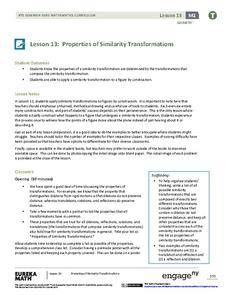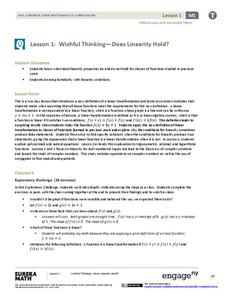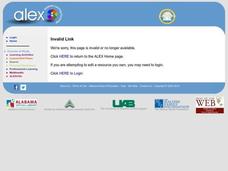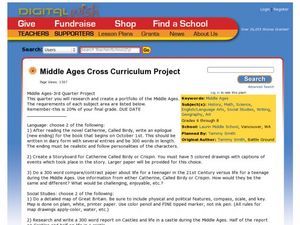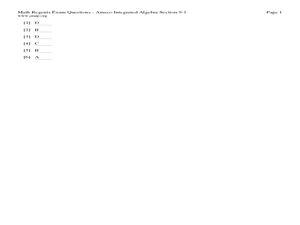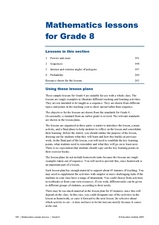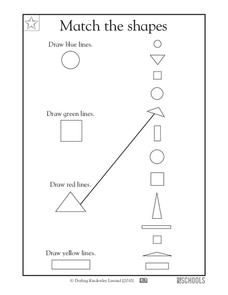Common Core Sheets
Adding and Subtracting Percents and Decimals
Seventh graders are challenged to find the sums and differences of percents and decimals. But first, pupils must find the value of the percent in order to add/subtract it from the decimal.
EngageNY
Two Graphing Stories
Can you graph your story? Keep your classes interested by challenging them to graph a scenario and interpret the meaning of an intersection. Be sure they paty attention to the detail of a graph, including intercepts, slope,...
EngageNY
Properties of Similarity Transformations
You can explain it, but can you do it? After learners view a sequence of transformations, the next logical step is creating the transformation. Challenge your classes to construct a composition of transformations and verify the...
EngageNY
Drawing a Conclusion from an Experiment (part 1)
Challenge your classes to complete an experiment from beginning to end. Learners make their own hypotheses, collect and analyze their own data, and make their own conclusions. They are on their way to becoming statisticians!
EngageNY
Rearranging Formulas
Model for your learners that if they can solve an equation, they can rearrange a formula with a well-planned lesson that has plenty of built-in practice. As the lesson progresses the content gets progressively more challenging.
EngageNY
Solution Sets to Inequalities with Two Variables
What better way to learn graphing inequalities than through discovering your own method! Class members use a discovery approach to finding solutions to inequalities by following steps that lead them through the process and even include...
EngageNY
Wishful Thinking—Does Linearity Hold? (Part 1)
Not all linear functions are linear transformations — show your class the difference. The first lesson in a unit on linear transformations and complex numbers that spans 32 segments introduces the concept of linear transformations and...
EngageNY
Properties of Parallelograms
Everyone knows that opposite sides of a parallelogram are congruent, but can you prove it? Challenge pupils to use triangle congruence to prove properties of quadrilaterals. Learners complete formal two-column proofs before moving on to...
EngageNY
Applications of Congruence in Terms of Rigid Motions
Corresponding parts, congruent parts, congruent corresponding parts—what does it all mean? The resource challenges pupils to identify corresponding parts for pairs of figures. It uses examples of figures that undergo rigid...
Curated OER
How Gear Systems Work: A Research Project
Students apply information regarding simple machines along with the math concept "ratios." The teacher introduces the concept that technology is the application of scientific knowledge and mathematics concepts to solve a problem. This is...
Alabama Learning Exchange
Understanding Fractions
Young learners explore fractions and demonstrate parts of a whole by using a candy bar and a piece of paper and dividing both into equal parts. Included is a worksheet that requires youngsters to color in half of each polygon shape. Some...
Curated OER
Middle Ages Cross Curriculum Project
Middle schoolers complete several projects on the Middle Ages. In this world history lesson, students complete language arts, social studies, math, and science projects. Some of these include: comparing a teenager's life now to that in...
Curated OER
Sets, Relations, and Functions
Sets, relations, functions, and graphing linear equations are practiced in this challenging activity. The class determines if a relation is a function or not and find the functional value of a domain element. The one page activity...
Curated OER
Powers and Roots
Eighth graders determine the square and cube roots of given numbers in this math lesson. They determine the missing number in a sequence. Additionally, they calculate the interior and exterior polygon angles.
Curated OER
Measuring our Hands!
How do we compare? Get your scholars measuring using this interactive and kinesthetic math activity. First, learners compare something (you announce- could be index finger, palm, feet, etc.) to classmates. Consider having them record...
Math Worksheets Land
Unknown Numbers in Sums and Differences
You've hit the word problem jackpot with this set of 10 addition and subtraction scenarios! For each, learners have to find a missing number. Sometimes it is the sum or difference, and for others, an addend or minuend. For each, there is...
Curated OER
Measuring Lengths Using Rulers
A visual measuring exercise that lends itself nicely to an all-class warm up, especially as it doesn't provide room for scholars to write in answers on the sheet itself. They examine 10 rulers and determine the length in either inches,...
Curated OER
Match the Shapes
Match the shapes! There are multiple potential objectives here as young scholars match shapes using different colored lines. There are four starter shapes and learners draw lines connecting them to matching shapes from a larger group....
Curated OER
In the Right Order
What comes first? Practice order of events with this sequencing activity. Learners examine two sets of pictures and write 1st, 2nd, and 3rd beneath the corresponding pictures. Encourage them to explain their reasoning, as there may be...
Curated OER
Adding Dice
Roll the dice! These addition number sentences are for beginning mathematicians, and each addend is displayed on a die. Learners add up two or three single-digit addends to find eight sums in the first half of this worksheet. Next, they...
Curated OER
Addition Grid
Which of these numbers add up to 20? Scholars find various addend pairs in a grid, circling those that add up to 20. There are many pairs they can find here, and the answer sheet offers some excellent kinesthetic practice ideas for...
Curated OER
Speed Problems
Challenge your fourth graders with these tricky word problems about speed. They use the formula for time, distance, and speed to solve six scenarios. There are three examples, each showing an instance when a different variable must be...
Curated OER
Color the Pattern
This geometric pattern will appeal to learners' artistic sides as they color various shapes based on a guide: they color circles blue, triangles red, squares green, and rectangles yellow. What does this finished design remind scholars...
Curated OER
Comparing
Practice the comparison words lighter, heavier, longer, shorter, smaller, and bigger using this visual chart. For each set of three objects, pupils order them according to one of these terms. The six terms are illustrated above for...




